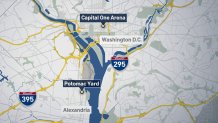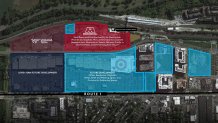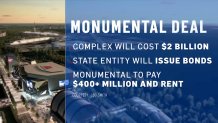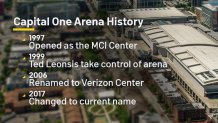Virginia officials and the owner of the Washington Wizards and Capitals announced a $2 billion plan Wednesday to partner on a deal that would send the teams across the Potomac River to play in Alexandria instead of D.C. The deal would transform a growing Northern Virginia neighborhood and send shockwaves through downtown D.C, which is accustomed to hosting tens of thousands of fans but has struggled with crime.
In the leadup to the announcement Wednesday, D.C. and Virginia lawmakers proposed dueling multimillion-dollar bids to either transform the Wizards' and Capitals' current arena in the District or spur the move across the river.
Ted Leonsis, owner of Monumental Sports and Entertainment — the company that owns the teams — and Virginia Gov. Glenn Youngkin announced within minutes of each other Wednesday morning that they will work together to "create a world-class Entertainment District in Alexandria at Potomac Yard, pending legislative approval and completion of definitive documents," according to a statement from Monumental.
"When we first came out here and I saw 70 acres and the ability to start with a clean slate," Leonsis said, "and imagine what would an arena 30 years from now need to be built and be served, and to build a digital-first experience, it really is a very, very romantic but also pragmatic vision that we have, that we can't do anywhere else. This place for people is one-of-a-kind."
The new nine-million-square-foot entertainment district would be developed by JBG Smith, Youngkin said. Plans for the development include an arena for both teams, a corporate headquarters for Monumental Sports, a Monumental Sports Network media studio, a practice facility for the Wizards, a performing arts venue and an expanded esports facility. Youngkin said the arena would also bring in new retail, residential buildings and more in an area where a new Metro station opened just months ago.


“This is the most visionary sports and entertainment development in the world, bringing together entertainment, sports, and technology in the most advanced innovation corridor in the United States: a once-in-a-generation and historic development for the Commonwealth, sports fans, and all Virginians," Youngkin said in a release. "The Commonwealth will now be home to two professional sports teams, a new corporate headquarters, and over 30,000 new jobs – this is monumental."
U.S. & World
Youngkin, Leonsis, Alexandria Mayor Justin Wilson, Sen. Mark Warner and other officials spoke at a news conference Wednesday morning at Potomac Yard in Alexandria, the proposed site of the new arena.
"We've still got some work to do," Warner said. "We need some additional plans on transportation, and because of the bipartisan infrastructure bill, the dollars we've got for VRE, for Metro, for additional road improvements, this stadium will be gotten to by those modes, but it will also be bike paths, walking, rapid bus — all of this will have to come together in a way that makes sense."
Renderings: See proposed Monumental Sports entertainment district for Potomac Yard
DC mayor had announced legislation to renovate Capital One Arena
The move would be a major blow to downtown D.C.
The 20,000-seat Capital One Arena hosts a total of 84 games per year for the Caps and Wizards — nearly one-quarter of all the days in a year — bringing in tens of thousands of fans. To have the teams leave D.C. within the next few years could be devastating to Bowser's post-pandemic comeback plan and to the neighborhood itself.
On Wednesday, D.C. Mayor Muriel Bowser said she and other District sports fans are disappointed by the decision and maintain that the District is the best place for the teams.
"National Landing Wizards doesn't quite have the same ring,” she said at a news conference, referring to a name frequently used by developers for a strip of neighborhoods that includes Potomac Yard.
Although Monumental owns Capital One Arena, the District owns the land on which it sits, and Leonsis has complained about the ground lease. That lease goes until 2047, but Leonsis would be able to get out of it in 2027 if he pays off a bond on the lease, which would cost about $36 million.
In 2016, Leonsis said he had "the worst building deal in professional sports," according to the Washington Post, which reported that he said he was paying $14 million per year in interest, $9 million in principal and maintenance costs that the year before cost $13 million. "By comparison, he said, most teams pay rent of $3 million to $4 million to play in municipally owned arenas," the Post reported.
Leonsis had asked the District this fall for some $600 million in improvements.
Late Tuesday evening, Bowser's office announced legislation to authorize $500 million of an $800 million project toward completely renovating and modernizing the teams' current home over three years beginning in 2024. Bowser called it "our best and final offer" to keep the Wizards and the Capitals "where they belong – in Washington, D.C."
On Wednesday, she told reporters she remains hopeful that the teams would remain in the District.
"We have been responsive to Monumental throughout our process and we have negotiated with, in good faith, with them over the last several months," she said.
"We know it's the best for the city, and, quite frankly, we think it's the best for the entire DMV," she said.
The legislation had unanimous support of the D.C. Council, the mayor's office said.
“We are committed to making the most strategic investments possible to keep the District on the best path forward and we view the revitalization of the Gallery Place-Chinatown community and the Capital One Arena as a lynchpin of that strategy,” D.C. Council Chair Phil Mendelson said Tuesday evening — the night before Youngkin and Leonsis would make their big announcement. “This project will fuel jobs, help local businesses, and serve as a top-tier destination for D.C. residents and visitors to the region.”
Plans for an improved Capital One Arena included more seating and more concessions. The plan also included adding a 2,000-3,000 capacity live music venue next to the arena.
D.C. officials also said they are committed to initiatives to make the area around Capital One Arena safer. The arena has long been credited as the driver that brought Chinatown and downtown D.C. back to economic success in the early 2000s. But now the arena is among the oldest in both the NBA and NHL, and the surrounding area has grappled with rising crime rates.
Leonsis said Wednesday that workers from Capital One Arena would be able to stay employed.
"We can employ all the people who worked at the arena in Washington, D.C.," Leonsis said. "We can create new jobs, a new tax base out here and really work to make the promise of Virginia and what our governor spoke about, but also we have a responsibility to do a great job and continue to invest in Washington, D.C."
'World-class city': Massive transformation planned for Alexandria's Potomac Yard
The proposed arena would be built just east of the popular Potomac Yard shopping center, long anchored by a Target store. It's also next to the new Potomac Yard Metro station, which opened just months ago in a neighborhood that's been developing rapidly in recent years.
The roughly $200 million of transportation funding that would be included in the deal would help double the capacity of that Metro station, with a walkway directly from the station into the arena.
"If we are here cheering on this announcement, we have to realize this is simply day one of the process," Warner said Wednesday. "Our job is to make sure that we take the transportation plan that's in place and make it world-class, as well. Our job is to make sure that the ... neighborhoods that are adjacent here at Potomac Yard, across Route 1 in Del Ray and other surrounding neighborhoods feel engaged and know their quality of life will be protected and, at the end of the day, their quality of life will absolutely be improved by this investment."
According to the plans released Wednesday, the existing shopping center would be redeveloped into an area with office and residential space, retail, at least one hotel, and community gathering spaces. The current shopping center includes a massive parking lot out front, but the plans promise "walkable retail."
"We're going to need to all go out and be missionaries in the community to make the case, to hear people's concerns, legitimate and otherwise," Warner said, "[and] come back and try to rectify those because with that effort, in a few short years, the kind of world-class city that Ted talked about will become a reality right here in Alexandria, Virginia."
The proposal includes at least one new hotel, a music venue/convention center and a $200-million transportation package, said State Del. George Barker. Another Virginia state senator close to discussions said the convention center would have 3,000 seats.
"You have so much contribution to what this community is about, and our moving here, if all of this goes as planned, we will still be a big big part of the entire DMV. That is our goal. That is our commitment," Leonsis said Wednesday. "Create jobs, pay taxes, hire people from Virginia Tech and George Mason [University]. We want to leave much more than we take."

Barker said the project wouldn't cost Virginia taxpayers anything because it would not come from an existing pool of money. A new state entity will issue bonds to pay for it up front, and Monumental is putting in $403 million, the News4 I-Team reported.
The commonwealth would own any arena and lease it to Monumental for 40 years, and the company's lease would pay off the project over that time, Barker said. The Virginia Economic Development Partnership didn’t return calls from the I-Team about how much the rent would be.
Multiple sources involved with the project said Youngkin's administration and the city of Alexandria were working hard on this proposal for months.
Originally called the MCI Center, Capital One Arena has been a piece of DC history since 1997
Before playing in downtown D.C., the Capitals and Wizards held their home games at the Capital Centre in Landover, Maryland.
They moved to their current facility — originally called the MCI Center — in 1997. After MCI was acquired by Verizon, the arena's name was changed to the Verizon Center in 2006, before it was again renamed, this time to Capital One Arena, in 2017. Just a year later, the Washington Capitals would go on to win their first-ever Stanley Cup.
Leonsis took control of the arena and full ownership of the Capitals in 1999. He later founded Monumental Sports and Entertainment, which owns and operates the arena.

Besides the Capitals and Wizards, the arena is home to the Georgetown men’s basketball team.
The Washington Mystics played home games there before moving to the Entertainment and Sports Arena in Southeast D.C. in 2019. On Wednesday, Monumental Sports said that may bring the Mystics back to Capital One Arena after the Capitals and Wizards vacate it.



